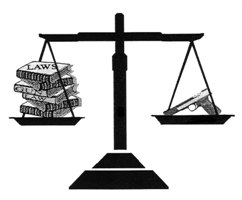In its recent opinion in GeorgiaCarry.org v. Georgia (11th Cir. July 20, 2012), the United States Court of Appeals for the Eleventh Circuit upheld Georgia’s ban on firearms in churches and other places of worship without permission of the place of worship’s administration.
In 2010, the Georgia legislature enacted a statute prohibiting the carrying of firearms in eight specific places: government buildings, courthouses, jails/prisons, places of worship, state mental health facilities, bars, nuclear power facilities, and polling places.
An exemption to this statute was provided for individuals with licenses to carry as long as, upon arrival at one of the aforementioned places, the license holder notified management and/or security personnel at the location and removed, secured, stored, and/or temporarily surrendered their firearm. Two individual plaintiffs, Edward Stone and Jonathan Wilkins (both carry license holders who regularly attend religious services and wanted to carry their firearms there), joined by GeorgiaCarry.Org, and Baptist Tabernacle Church of Thomaston, GA, subsequently filed suit.
The plaintiffs alleged that their First Amendment free exercise of religions and Second Amendment rights were being violated by Georgia’s ban. The district court disagreed and dismissed the case with prejudice on a 12(b)(6) motion. Plaintiffs appealed and the Court of Appeals for the Eleventh Circuit upheld the dismissal.
Finding that the plaintiffs could not establish that the ban on carry in churches burdened a sincerely-held religious belief, the appeals court rejected the plaintiffs’ arguments that the statute at issue interferes with the free exercise of religion by prohibiting plaintiffs from “engaging in activities in a place of worship when those activities are generally permitted throughout the state.” The court noted that the Free Exercise Clause does not protect mere personal preferences or secular purposes, which the Eleventh Circuit found the plaintiffs’ assertions of wanting to carry firearms in church for self-defense to be.
The Court of Appeals found no Second Amendment protection for the plaintiffs, either, concluding that enforcing the statute at issue against a license holder who carried a firearm on private property against the property owner’s wishes would be constitutional because “the Second Amendment does not give an individual a right to carry a firearm on a place of worship’s premises against the owner’s wishes because such right did not pre-exist the Amendment’s adoption.”





